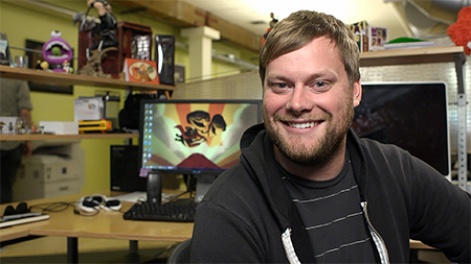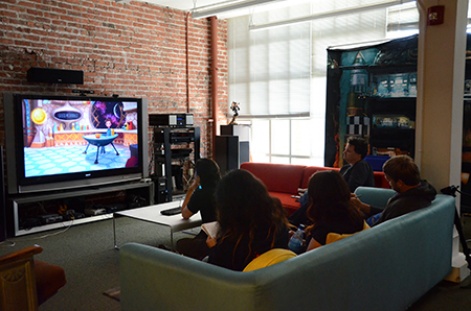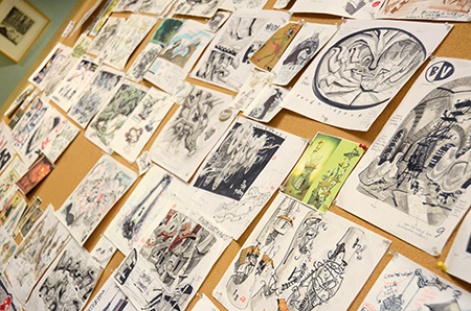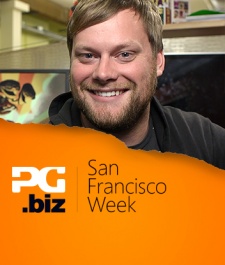It would be remiss of us not to pay homage to the mad scientists at Double Fine Productions during our week long look at the development scene in San Francisco.
Founded by legendary LucasArts adventure game designer, Tim Schafer, in 2000, Double Fine could be defined as the quintessential Californian games studio.
Cases in point: the studio has jumped from the heavy metal of Brutal Legend, to the humour of Psychonauts, and on to the bright colours and varied landscapes of Broken Age.
Double Fine's hunger for variety isn't just window dressing, however. Key to the studio's success has been its move to serve up games of every shape and size, and the firm even broke the mould by popularising crowdfunding for game development.
But what role has the studio's roots in San Francisco had on its success, and what does the city by the Bay have to offer?
Downtime
We caught up with the studio's producer, Greg Rice, just as this year's Amnesia Fortnight - Double Fine's internal game jam that runs for two weeks and often delivers the raw shoots for the studio's next big project was getting underway.
"It's good for me because I get to shut my brain off," says Rice.
"It's a chance to reset, get creatively inspired and work on something new. You put down whatever else you've been working on for a while, but by the time you get back to it you're excited to be doing it again. With this first public one, with the livestreaming and the documentary stuff it's actually longer hours than crunch!"
That's the kind of work load that seems to run contrary to the initial idea behind the game jam, which was initially pitched as a way to help the studio to relax and reset after completing a major project.
Rice and his colleagues, however, seem to feed off the jam's energy an energy that's only heightened by Double Fine's decision to broadcast it live to the gaming public via Twitch.

Greg Rice
2014's Amnesia Fortnight has been used as a buffer to mark the completion of the first part of Broken Age the studio's massive new adventure game that fuelled Kickstarter's fire.
"We had no idea what to expect but it's been amazing. Our backers have been really pleased and have been calling it out as an example of people delivering on their Kickstarter promises," claims Rice.
"The reviews have been mostly positive and it's been nice to see people grasping with the project and understanding what we wanted to do. It's only the first half though and some people are waiting for the second half before they give final judgement.
"Everyone is glad to have that behind us and hear what the community thinks and get on with Act 2."
Broken Age was the first major video game success on Kickstarter, raising close to $3.5 million after asking for just $400,000. It remains one of the biggest online crowdfunding drives ever.
Topping targets
The studio's next game, Massive Chalice, also started life on the crowdfunding platform, amassing fund of $1.2 million again, a total that far surpassed the initial target of $750,000. As far as Kickstarter goes, it's fair to say Double Fine knows its onions.
"Kickstarter is a hard thing because it is a totally open market. Anybody can go and pitch an idea and get funded," says Rice.
"Ultimately a lot of people won't be able to pull it off. There definitely will be and have been stories of that happening. A lot of people are waiting to pounce on those stories which is unfortunate because there are so many people that this would work great for.
"We knew there would be a lot of eyes on it so we wanted to make sure that we got it right and we really delivered on what we were promising.
"We're seeing money coming in and we're being successful so want to continue to see this to grow as part of the industry."
Of course, Kickstarter's continuing role hangs on the majority of developers keeping their promises delivering games on time with the content promised all in tact. Indeed, Rice says the community's ability to identify the good and bad projects in the future is key to Kickstarter's sustainability for developers.
"We pay attention to the risk that fans might become less interested because we want Kickstarter to continue to be an opportunity for us," Rice tells us.
"We try and help out other people when they come to us with Kickstarter ideas or want help with their pages, to try and build a bit of a community around it. It's a bummer when it doesn't work, but that's part of it. The good stuff will rise to the top and eventually it will sort itself out. People will know what to look for and what to expect."
"I haven't seen these problems such as delays or overspending as much in other departments of Kickstarter like art and books. With games it comes from a lack of knowledge from the general public about how games are made and the challenges that we face."
A matter of input
The other problem for the developers that utilise crowdfunding face - especially with early Kickstarter projects like Broken Age - is the fact that some backers expect to have a hand in the game's development.
They look for their views to dictate the direction of the project as it moves forward.
Rice says the presence of Tim Schafer helps Double Fine to get around this problem, because the backers and customers trust that his studio will be able to do a good job.
"Some people might think 'now I'm an investor and I should be able to tell you what kind of game you should be making,' but ultimately our backers trust us because of Tim. They want to get a Tim Schafer game out of the deal," Rice argues.
"They know that we're the experts and that we'll put out something that they will like. In general, having that many eyeballs on you all the time, there are always people bringing up concerns and issues, but we try to be honest and transparent with our backers and listen to what they're saying.
"If they have an opinion different to ours then we'll sit down with them and explain the decision as we would with any member of our team.
"Once we do that they understand where we're coming from, so it's more of a communication thing than anything."
The Double Fine office
As promised, Broken Age is currently bound for smartphones a notable move for Double Fine, if only because it's previously kept mobile support restricted to smaller releases, such as Middle Manager of Justice. As Rice points out, it's imperative that games suit the platforms they're launched on.

"Mobile got Tim really excited about adventure games again because it is so tactile and a point-and-click adventure is really well suited to the device," says Rice.
"Most of us have phones and tablets that we play games on and we really like that experience. We wanted to explore it. Whenever there is an idea that fits the platform we will consider it. It's looking at each game individually and deciding if it fits."
However, Rice admits Double Fine hasn't pinned mobile down just yet. He believes that a lot of studios are still experimenting when it comes to figuring out how to profit when working within one of the industry's most competitive marketplaces.
"There are a lot of people trying to do a lot of different things," he adds. It's exciting because it gives the developer power over pricing and sales and lets people try a lot of weird experiments. That will lead to us figuring out the spaces that work.
"As soon as you open up the platform and let the developer decide what to charge and how to sell their game that will only lead to more experimentation as people figure out how to profit."
At home
It's easy to look in from the outside and see Double Fine as a key player in the San Francisco game development community. The studio's relaxed outlook on life and games is perfectly suited to the Californian scene.
Rice isn't a native Californian, but he's never felt more at home than he does now.
"As soon as I came here I thought 'man, there is something going on here.' It's totally different to anywhere else. It's so full of friendly people who aren't judgemental. It's also a city that wants to push things forward with technology and web companies. Everywhere you look there is a new startup with a crazy idea that might be the next Twitter," claims Rice.
"It's a really stimulating environment. There are indie studios springing up everywhere. It's great to be around people who are pushing the industry in lots of different ways.
"Right across the street is Gaijin Games. Supergiant is a few blocks away. Funomena, the new company by Robin Hunicke and Keita Takahasi is just down the street. The Humble Bundle guys are here and there are even one man shops like Jonathan Blow and Chris Hecker. There is a really vibrant indie community."
It's not just the indie community that studios are well placed to take advantage of in San Francisco. The city has also become a natural hub for a huge proportion of the world's video games media.
Double Fine and its neighbours enjoy close relationships and in some cases close friendships with well-known faces from the games press.
In the connected online world, it's possible to court the press wherever you're based, but for San Francisco's indie studios, having the media on their doorstep means it's possible to build relationships in an almost natural manner, without the need for a dedicated PR team.
"We want it to be a really open conversation where we can speak directly to fans and the press without a layer of false marketing bullshit in between. We're making these games because we're passionate about them and we want people to experience them," says Rice.
"If we just talk about that it shows and we don't have to do flashy marketing stuff to sell our games. Over the last four or five years we have been tearing down that wall to involved everyone in the studio in our messaging and show people everything that is involved in making games and how it all fits together.
"It's a team of creative people that our building our experiences and getting those people in front of the press is great for our games."
It's common for independent game developers, even in one or two person outfits, to try to hand;e marketing, PR and customer relations internally. It's generally accepted that this is a choice determined by a lack of budget, but according to Rice, taking charge of your PR activities can prove to be something of an advantage.
"A lot of people in the indie scene try to represent their game themselves because of financial limitations because but ultimately it is just better to do it our way," argues Rice.
"It does eat up a lot of time though when you would rather that the team is working on the game as much as possible, making the game better. But it's just a matter of finding ways to get them out there."
Challenges
In San Francisco, this approach is easier said than done, because the costs of living and working in the city are huge. Such costs can severely impact upon any business, especially at startup level.
Rice says this is the biggest challenge for new games companies in the Bay Area.
"I think San Francisco is the second most expensive place in America after New York. It's definitely more expensive than L.A. With a larger studio it can be hard to keep up your headcount and keep paying people's salaries," says Rice.
"It's worth it for what you're getting though. There are so many amazing things going on. I can drive an hour and get to Wine Country or Redwood Forest. The food here is incredible. It definitely is expensive and it's a hard decision to start a company here, but there's a lot going on.
"A one bedroom apartment in the city is going to be at least $1,500 a month, which is crazy. I came from Iowa and my apartment there was about $200 to $300 a month, but if you visit, it will probably win you over anyway."
The Double Fine concept wall
Despite all of this, the gaming scene in San Francisco is thriving. New studios spring up all of time and the list of successful games made here reads like a who's who of indie games.
In typical California style, the games community in the Bay is extremely informal and is built on friends just hanging out together, but Rice says more can be done to share the kinds of stories that would benefit business and the games being made there.

"There are some cities doing a better job of getting their game development community together regularly to show games to each other and talk about what they're working on and what struggles they are facing," he says.
"There's a lot of that informally here, but we could do a better job of throwing events to get all of those developers together to bounce ideas off of each other."
Check back tomorrow when San Francisco week continues with Gaijin Games.





















